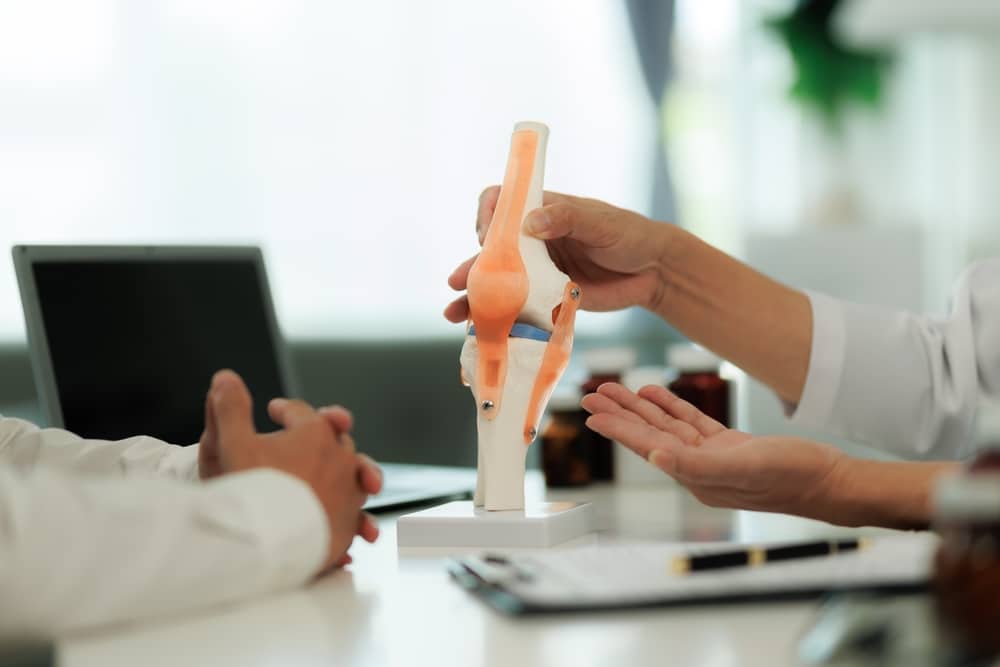Overview
Frozen shoulder, medically known as adhesive capsulitis, is a condition characterised by progressive pain and stiffness in the shoulder joint. It typically develops slowly and can significantly restrict daily activities.
Although often self-limiting, frozen shoulder can persist for months or even years without appropriate management. Early recognition and intervention can significantly improve outcomes and help to reduce long-term pain and disability.
Anatomy
The shoulder is a ball-and-socket joint, providing the arm with a wide range of motion. It is stabilised by a flexible capsule of connective tissue that surrounds the joint. If you have a frozen shoulder, this capsule becomes thickened, inflamed, and contracted, severely restricting the joint’s movement. Adhesions (bands of scar tissue) can also form within the capsule, further limiting mobility and causing pain.
Causes
The exact cause of frozen shoulder is still not fully understood, but there are several factors that are associated with its development:
Primary (idiopathic) frozen shoulder: This is when a frozen shoulder occurs without an obvious cause.
Secondary frozen shoulder: This is when it is likely to be linked to underlying conditions, such as:
- Diabetes mellitus (significantly increases risk)
- Thyroid disorders (hypothyroidism, hyperthyroidism)
- Previous shoulder injury or surgery (e.g., rotator cuff tear, fracture, mastectomy)
- Prolonged shoulder immobilisation after injury
- Cardiovascular disease
Frozen shoulder typically affects people between the ages of 40–65 years and is more common in women.
Symptoms
A frozen shoulder progresses through three overlapping stages:
Freezing Stage (Painful Phase):
- Gradual onset of pain, often worse at night
- Pain is often described as being over the upper part of the arm (the badge area)
- Increasing stiffness
- This phase usually lasts from 6 weeks to 9 months
Frozen Stage (Stiff Phase):
- Pain may reduce somewhat, but stiffness persists
- Difficulty with movements such as reaching overhead or behind the back – doing up your bra or reaching for your seatbelt.
- Lasts from 4 to 12 months
Thawing Stage (Recovery Phase):
- Gradual return of range of motion
- Minimal or no pain
- Lasts from 6 months to 2 years
Without any intervention, the overall course of frozen shoulder can last 1 to 3 years, however with the correct treatment this can be significantly reduced.
Diagnosis
Frozen shoulder is usually diagnosed clinically through a combination of history and physical examination.
Key findings include:
- Significant shoulder movement restriction in both active and passive range of motion – especially in overhead movements.
- Specific loss of external rotation of the shoulder – taking the shoulder out to the side away from your body.
- Global stiffness affecting daily activities
Investigations may be used to rule out other causes of shoulder pain:
- X-rays: To exclude arthritis, fractures, or dislocation
- MRI scan: May show thickening of the joint capsule and exclude rotator cuff tears
- Ultrasound: Useful to assess for other soft tissue injuries
Differential Diagnosis
Other conditions that can mimic frozen shoulder include:
- Rotator cuff tear
- Shoulder osteoarthritis
- Calcific tendinitis
- Subacromial impingement syndrome
- Cervical spine disorders (referred pain)
Our consultants will ensure that you receive an accurate and timely diagnosis so that you can start an effective treatment programme.
Treatment Options
Non-Surgical Management
Most cases of frozen shoulder improve well with non-operative treatments:
- Physiotherapy: Key to maintaining and restoring range of motion through stretching and mobilisation exercises
- Pain management: NSAIDs or analgesics for pain relief
- Corticosteroid injections: Can reduce inflammation and improve mobility, especially during the initial, painful ‘freezing stage’
- Hydrodilatation: A procedure where sterile fluid is injected into the joint capsule to gently stretch and expand it, often combined with a corticosteroid. This is often very beneficial during the ‘frozen phase’
Patience and persistence with rehabilitation are really important, as improvements can often be quite slow and take several months.
Surgical Treatment
Surgery is only considered in severe cases where:
- Severe stiffness persists despite having had at least 6-9 months of comprehensive non-surgical treatment such as physiotherapy and injection therapy.
- Pain and functional limitation are significantly impacting your sleep, quality of life and mental health.
Surgical options include:
Manipulation under Anaesthesia (MUA):
- The shoulder is gently moved through a full range of motion under general anaesthesia to break adhesions and stretch the capsule.
- Risk of complications is low but includes fractures or rotator cuff tears.
Arthroscopic Capsular Release:
- A minimally invasive “keyhole” surgery.
- A camera and instruments are inserted into the shoulder to carefully divide and release the contracted capsule.
- Often preferred due to greater control and precision compared to MUA.
Outcomes:
- Surgical treatment typically provides rapid and significant improvements in pain and motion.
- Most patients regain near-normal function within 3–6 months postoperatively with appropriate physiotherapy.
- Recurrence of frozen shoulder after surgery is uncommon but can occur, especially in diabetic patients.
Frequently Asked Questions
Is frozen shoulder permanent?
No, most cases eventually resolve with time and treatment, although full recovery can take up to 2–3 years.
Does frozen shoulder always require surgery?
No, the majority of cases improve with non-surgical treatments. Surgery is reserved for severe, persistent cases.
Why is frozen shoulder more common in people with diabetes?
High blood sugar levels can lead to thickening and stiffening of connective tissues, increasing the risk of developing adhesive capsulitis.
Can frozen shoulder affect both shoulders?
Yes, although less common, some individuals may develop frozen shoulder sequentially in both shoulders.
What activities should I avoid with frozen shoulder?
Avoid aggressive, forceful stretching or overhead activities that exacerbate pain. A guided, gentle physiotherapy programme is recommended.




